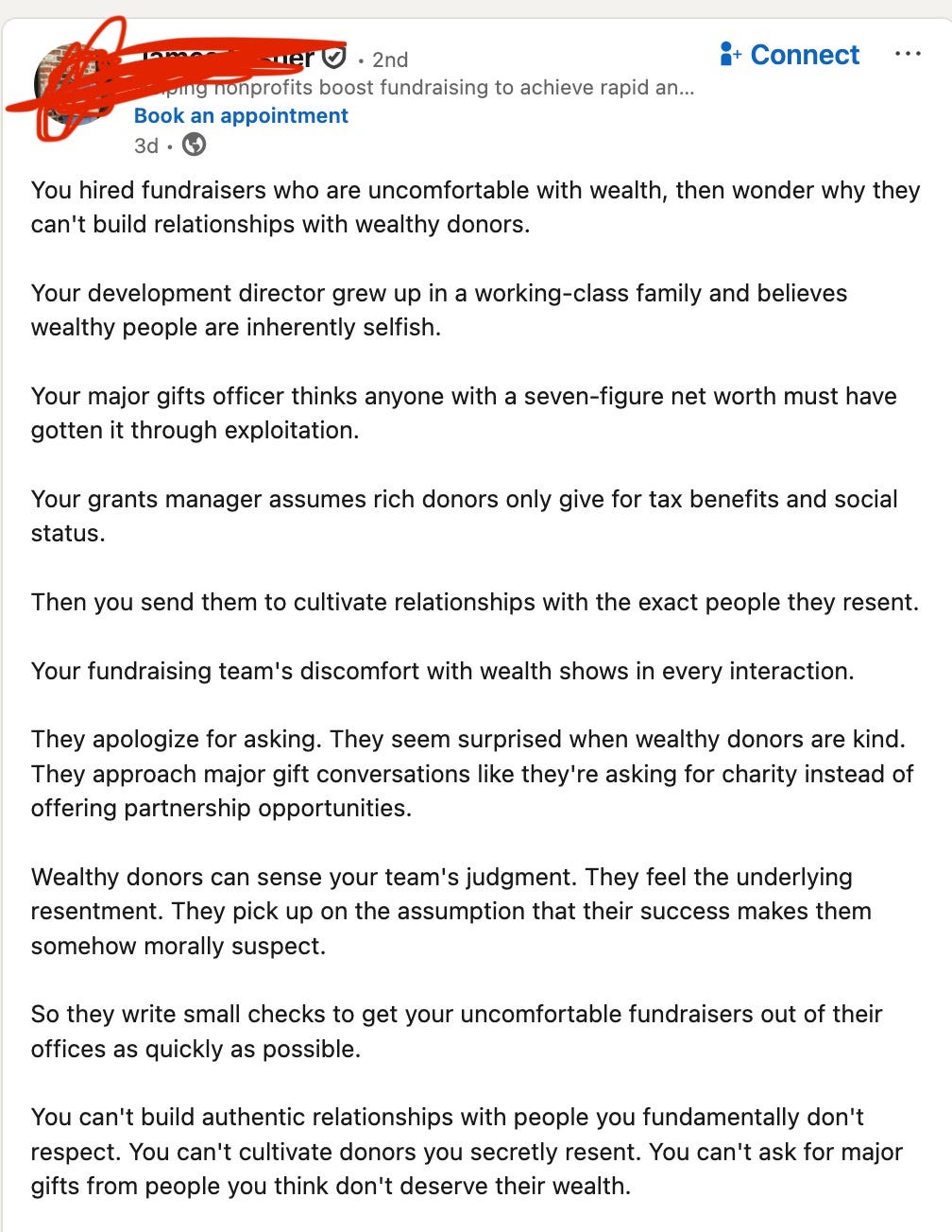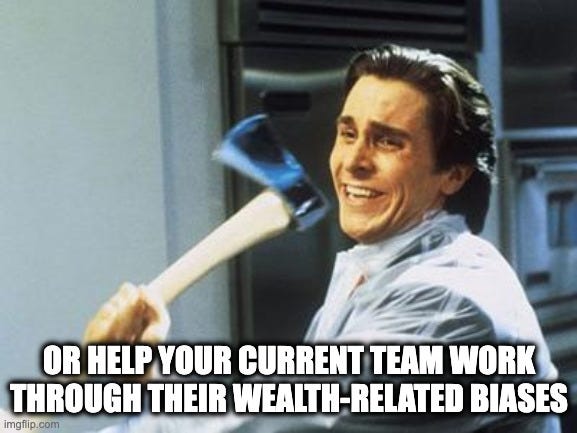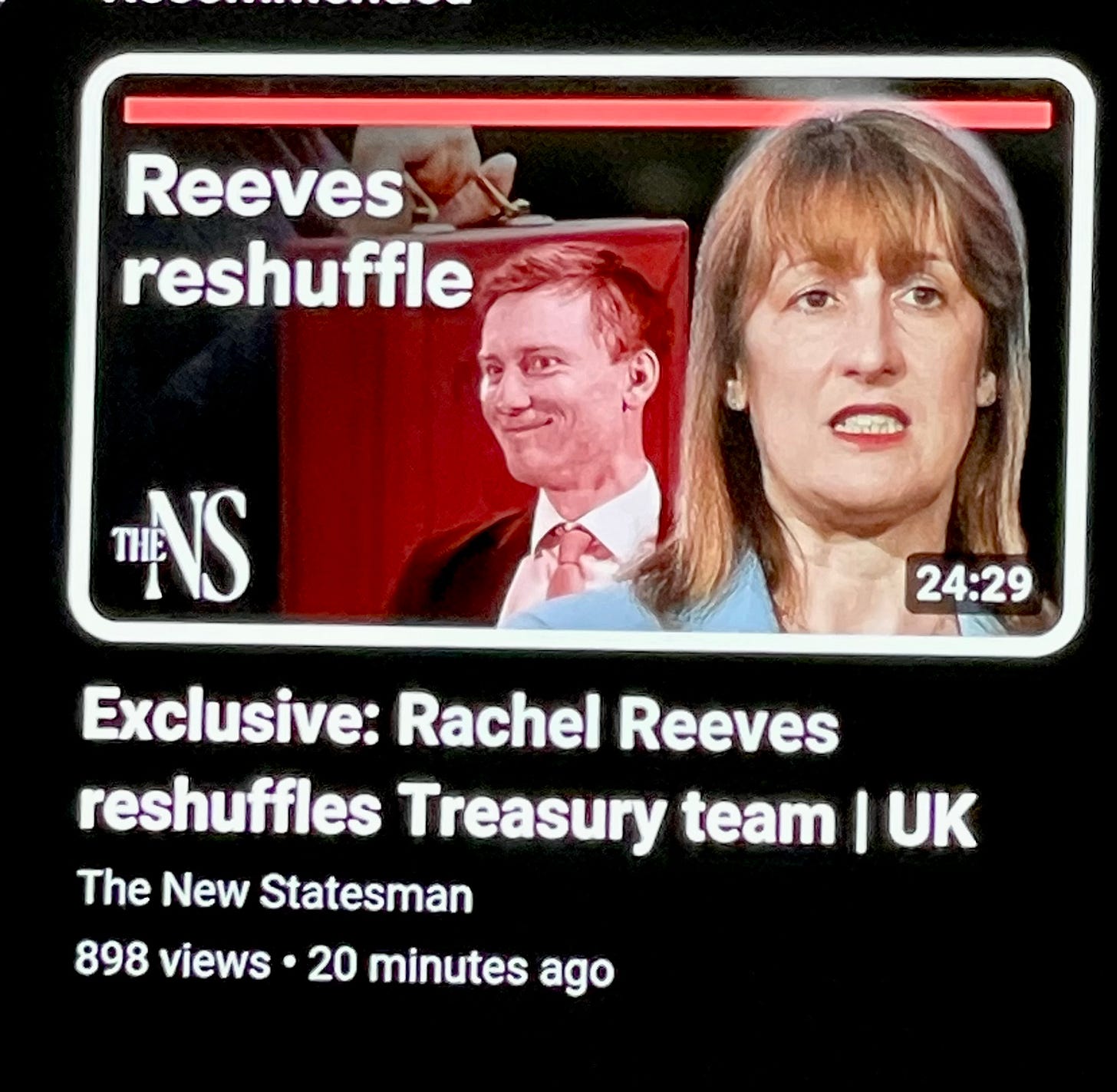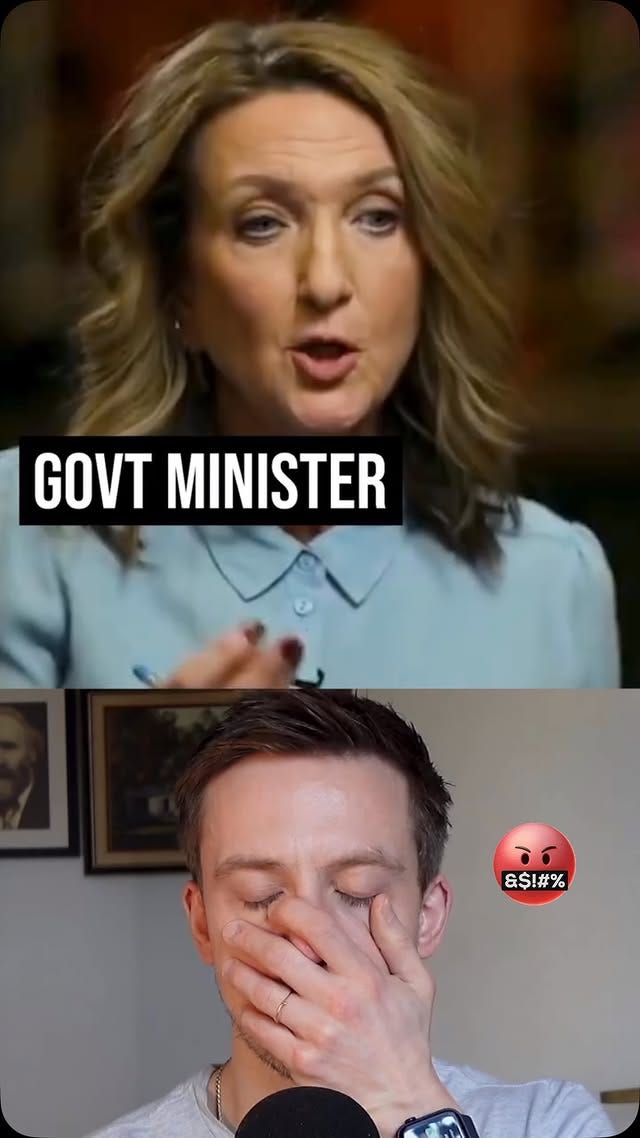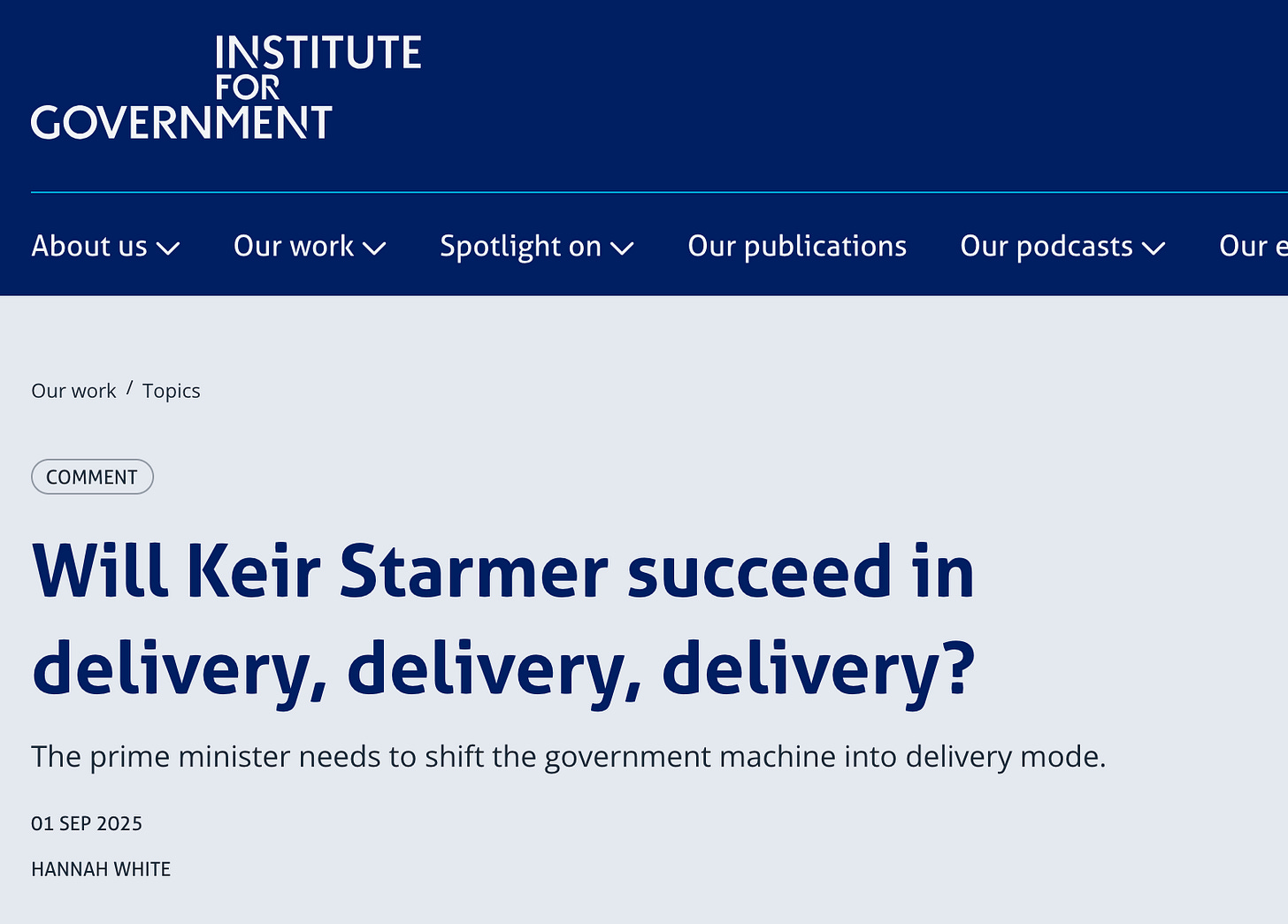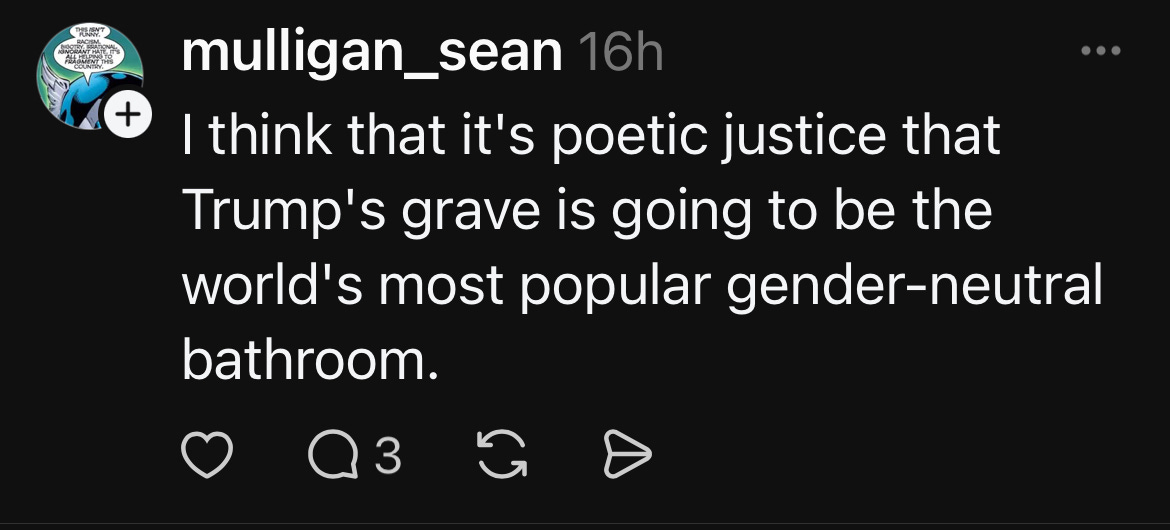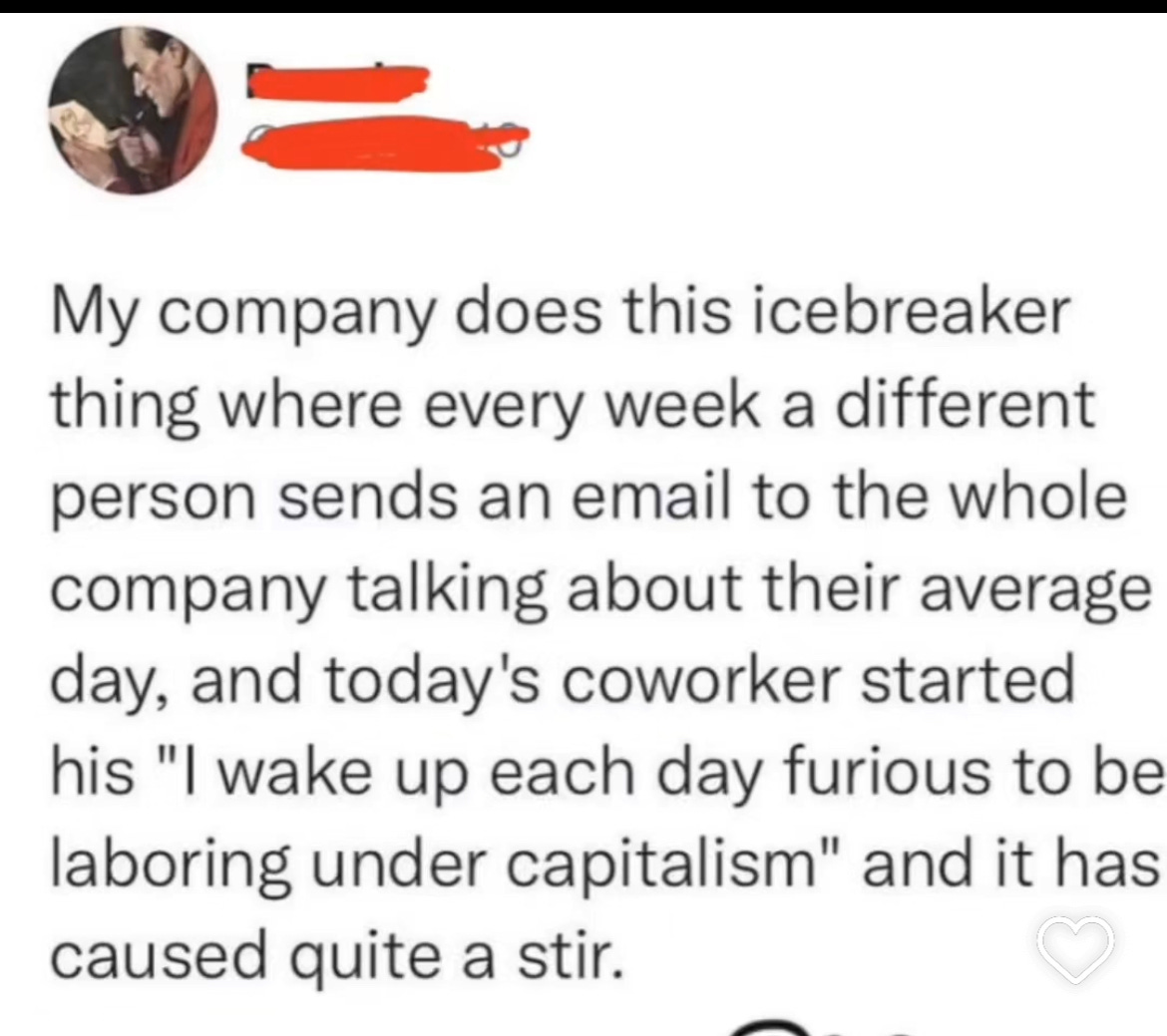Philanthropy Bro 'wisdom' and wealth
Should we really get 'comfortable' with being around wealth? Plus a general roundup of UK news. Prepare for a ranty one.
No huge essay this week: a very bloggy blog. Bits and pieces of thinking drawn from the news and beyond with relevance to politics, society and (about 50%) charity. Warning: it’s quite shouty.
The Philanthropy Bros
Linkedin posts like these are why I have a very serious problem with the notion of philanthropy. Truly emetic. Have a read:
It gets better:
“Your donors aren't the problem. Your team's attitude toward donors is the problem.
[..]
Either hire fundraisers who genuinely appreciate successful people, or help your current team work through their wealth-related biases.
[..]
”Stop expecting people who are uncomfortable with wealth to be successful at wealth-based fundraising.Because in fundraising, your team's attitude toward donors determines your donors' attitude toward you.”
- American bloke, Linkedin post 3rd September
What I increasingly find is that fundraisers are indeed uncomfortable with wealth. (And they write to me all the time to tell me this.) As I’ve noted elsewhere, the sense of discomfort in the pit of the stomach for many fundraisers who sit between the greedy and the needy is leading to burnout from the sheer toxicity of working constantly against their core beliefs. We’re all well aware of “donors’ attitude towards us.”
All the professionals the poster lists as the ‘problem’ in nonprofits are precisely the people who should be in charge. Because, yes, strangely, people who see the sharp end of inequality don't believe the wealthy are magical humans. They know these are most often the greedy lucky children of the wealthy. (“Not all of them!” Well, perhaps. But the ‘working class made good’ are often the worst of the worst.)
As I said to a Linkedin commenter who added the obligatory ‘not all philanthropists’ volley, we need to change this narrative. Even if some individuals are decent, the system should be doing more to make less money available for philanthropy, frankly. If the wealthy truly believe they’re doing the lord’s work, as someone who hoards wealth then throws some crumbs (or even a handful) to the poor, there are a few key checks: would you be just as happy to pay that money in taxation? Would you be happy for the money to be given with absolutely no evidence to the outside world of your giving? Would you be willing to give it to fund toilet paper and printing? And would you be happy for the use of that money to be decided democratically? If not, you can jog on.1
I’ve written extensively elsewhere about the Tech Bros (as an example) who detoxify themselves with the most self-interested forms of philanthropy in the tradition of the Gilded Age billionaires. But within the philanthropy industry itself, there are very identifable Philanthropy Bros. (To be fair, they aren’t all of the male variety.) You can guarantee the word ‘portfolio’ will appear rapidly, not to mention a hell of a lot of macho impact. They like to swagger around and pretend that they are ‘comfortable with wealth’ and ‘genuinely appreciative of successful people.’ But to me, I’m always put in mind of the tiny fish that hang around the mouths of sharks, whose teeth they clean. They might well imagine they are best buds with the sharks - but the sharks just find them useful. And not even worth eating.
In the comments, alongside significant concerns from decent people, more wealth-cult bullshit nuggets bobbed around like it was a Kentish beach. Honestly, I was expecting some of them to start quoting the Kardashians, The Secret or indeed, Donald Trump. Maybe we should all just manifest.
As I’ve been arguing for the last year, I think we all need to get much less comfortable with wealth and the wealthy. We need to stop asking, and start taking, through taxation and legislation. We need to recognise that most wealth in philanthropy is twice stolen - once through profit exploitation, and once through tax avoidance. And there is much more to be done in actively shaming the extremely wealthy - not flattering.
As charities and nonprofits start to recognise and embrace their own values, rather than those imposed by ‘philanthropy’, and fight to end this inequality rather than simply mop up after it, we won't need hot takes like this polluting our work. And we won't need to keep courting the kind of philanthropists who require them. ‘Your donors aren’t the problem’ is so wrong. They are EXACTLY the problem.2
[As an aside: I couldn’t help seeing something of an on-ramp here, through expectations of ‘genuine appreciation of successful people’, with the culture that has led to notorious sexual abuse scandals in the philanthropy sector. Some of my fellow Substackers will well recognise this….]
Go deeper: and criticise the right things
That post did put a lot of people’s backs up: some excellent take downs followed and the Good Eggs were close to cracking on our LinkedIn chat. But as ever, elsewhere many went to a place of individualised diversity rage as opposed to challenging the more fundamental injustice. “What about working class people!?” they cried. “You’re excluding them from these jobs.”
Okay, so, let me get this straight: our critique is “But that means that people from poor backgrounds can’t beg rich people for money - to fix the society those same people broke.” Are we saying “everybody should be equally allowed to beg rich people for money”?
Excuse me for a moment.
It is not enough to say ‘we need to help a wider range of people be exploited by capitalism.’ These are the kinds of arguments I’m so tired of seeing in the DEI industry.
My suggestion: working class people should avoid these jobs like the plague, and redouble campaigning and activism to make this unecessary. This may be through the formal nonprofit sector, or it might be using skills they have built there - for example, as fundraisers - to take action which will be far more valuable in the long term than just begging for scraps for a soup kitchen.
We need much bigger ambitions than voluntary capitalist giving, run by Philanthropy Bros who get excited at the thought of a rich Zaddy giving them a ride in their Tesla.
And if you must have the ride (it’s okay if you enjoy it, I won’t tell anyone), at least go back later and steal the hubcaps.3
I’m a realist. We need these people’s money. Day by day, do your best to smile and show your appreciation of their success. But please don’t forget what this is really about. The end goal of our work should be that Philanthropy is unnecessary, beyond the odd wing of a gallery or opera house.
Quick bits
Black Rock and Lloyds are stealing your homes
There are some very concerning things happening in the rush to build in housing markets that we aren’t talking about enough. These are global changes and dangers.
Black Rock, the asset management company who won’t get out of my LinkedIn feed, are buying up thousands of homes across the world because they recognise this is an asset that will provide ongoing income ad eternam - and remove all possibility of control over their own living situation from the hands of mortals.
Meanwhile in the UK, Lloyds PLC plans to own 30,000 homes by 2030 for rent. Again, some of this will add to the stock (others will just be taken into private ownership - some by repossession on mortgage defaults when the crunch happens) - but what it will also do is put more and more capital and wealth into the hands of the 1%.
None of this is to be welcomed. It is not the solution to the problem: it is more of the same problem.
Oh, great. Rachel Reeves is reshuffling the Treasury. 🙄
Rachel Reeves reshuffling her team goes way beyond rearranging the deck chairs on the Titanic.
This is more like letting the iceberg decide the seating plan.
Letting Torsten Bell come and work directly on the budget is wise, and politically savvy, I think, given that at some point the unthinkable may need to happen and Reeves will shuffle off. Obviously, Bell has the most actual economic expertise in the Government.
Amusingly, Gary Stevenson recently called him ‘the poshest man I have ever met’ when he was on Campbell and Stewart’s The Rest is Politics. I don’t think that interview was Stevenson’s finest moment, but it was certainly amusing to hear, and to see Alastair Campbell almost shoot his drink out of his nose.
Meanwhile, Owen Jones doesn’t think much of Bell, and I must say Bell’s performances in the hot seat on political interviews are pretty amateurish. He does come across as incredibly arrogant and snooty. I’m hopeful it’s because he is being wheeled out to defend the indefensible rather than a sheer lack of ability or understanding.
Bell’s economics are focused on growth through investment and reducing inequality. Or at least, they were when he wrote his book and before he became a junior minister. What his input can be at this stage, when Labour have still decided to live with their pre-election acts of policy self-mutilation, remains to be seen. More and more in Government, Bell has seemed to be an arch Blairite. But even a Blairite would be an improvement to the Cameron 2.0 government we are currently experiencing.
Impact, Impact, Impact and Delivery, Delivery, Delivery
A couple of weeks ago, I talked about the obsessive focus on instrumental terms to describe our work in the voluntary sector: impact, change, tranformation, rather than meaningful words like love, hope, care, community. And now Keir Starmer is pushing ‘delivery’. It’s another of those words that betrays no values, no morals, no end goal. And that, perhaps is because he has none of those, beyond the ‘business as usual’ of neoliberal economics.
This was always the danger: that we elected (with little choice) a Government who quite clearly had zero idea of what a good society looked like, except that its economy should grow.
Starmer’s belief that ‘delivery’ of whatever is delivered will be seen as meaningful in itself ignores the very clear signals around us all: that we desperately need a bolster against very different values spreading like herpes across the country and world.
And this refusal of progressives to fight on values - and especially on economic injustice - is why this is happening. Starmer is deliberately avoiding the difficulties of overt ideology, of values, or big words, sticking with the covert kind of ‘common sense’ values and ideology (neoliberal business as usual), and focused on technocratic ‘stuff’.
Long forgotten now is the incompetence of the Tories - and indeed, nobody cares. As demonstrated by Reform’s ongoing success despite their local Council disasters, and with the incompetent administration in the US, people could not care less about competence. In fact, its effects may even be sadisitically valuable to people. The damage of state incompetence feeds into the ‘burn it all down’ demands which go hand in hand with right wing hatred.
Starmer, and the rest of us, need to understand: the fight is over values. Without that, left wing parties are doomed to irrelevance, electoral defeat, and indeed, to complicity in the rise of the Right. As Howard Zinn put it, ‘You can’t be neutral on a moving train.’ You’re on it, or you’re off it.
Weekly internet nonsense
Finally some good news! I absolutely love this. So many empty Debenhams branches have left a real scar in town centres. (And my mum is bereft…) I can ride a skateboard you know. I mean, a few metres. I wasn’t an athletic child.
It’s a cheap gag and I’m totally here for it. Have to confess I got caught up in the excitement over the weekend…. (Wink wink.)
This guy is my spirit animal.
This series of AI videos gets better and better.
And finally:
Barely Civil Society is about making the nonprofit world braver.
Here are three ways to help
1. Subscribe and share!
Subscribe and share! To receive new posts and support this work, consider becoming a free or paid subscriber. Or share this post.
2. Support!
If you donate to my work, you can help me spend more time researching and writing - including some bigger projects I’m working towards. Could you buy me a coffee?
3. Send me a message
The messages people send me every couple of weeks are my favourite thing. Drop me a line and say hi! What made sense to you? And what didn’t? (Be nice.)
Somebody also used the phrase ‘two things can be true’ which is getting to be up there with ‘it is what it is’ as one of the most exasperating thought-terminating cliches. If you have two things which appear contradictory, the point is not to stop and say ‘oh look, two things that appear contradictory, funny that’. The point is to ask how those contradictions can be understood and worked through. That way, a better truth might be arrived at. That is literally the whole history of philosophy and human intellectual discussion (hello Marx, Hegel). If you mean we need to have more nuanced opinions, that is not the same thing. My opinions are nuanced in practice: but there is a rebalancing of the debate sprely required. More and more of us on the charity side - not the ‘philanthropy’ side - are becoming willing to speak out about this.
And a quick reminder: I am hardly alone in these opinions, even amongst some decent rich folks.
Look, as I’ve said many times, I do not doubt that there are decent ‘philanthropists’ out there - although I suspect that authenticity and frequency of self-description as ‘philanthropist’ are inversely proportionate. The most adorkable (Spider-) man on the planet, Tom Holland, whom I would adopt in a heartbeat, has said he wants to build a ‘free’ school with facilities comparable to the best private schools. I don’t doubt this guy is sincere. It’s a well-intentioned idea. But…. Sigh….
No, he’s too adorable I can’t even say it. You just keep doing you, Tom.
Anyway, the Philanthropy bros will be circling soon.



